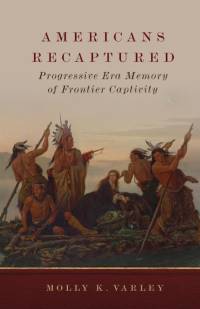Om Americans Recaptured
It was on the frontier, where "civilized" men and women confronted the "wilderness," that Europeans first became Americans-or so authorities from Frederick Jackson Turner to Theodore Roosevelt claimed. But as the frontier disappeared, Americans believed they needed a new mechanism for fixing their collective identity; and they found it, historian Molly K. Varley suggests, in tales of white Americans held captive by Indians.
For Americans in the Progressive Era (1890-1916) these stories of Indian captivity seemed to prove that the violence of national expansion had been justified, that citizens' individual suffering had been heroic, and that settlers' contact with Indians and wilderness still characterized the nation's "soul." Furthermore, in the act of memorializing white Indian captives-through statues, parks, and reissued narratives-small towns found a way of inscribing themselves into the national story.
By drawing out the connections between actual captivity, captivity narratives, and the memorializing of white captives, Varley shows how Indian captivity became a means for Progressive Era Americans to look forward by looking back. Local boosters and cultural commentators used Indian captivity to define "Americanism" and to renew those frontier qualities deemed vital to the survival of the nation in the post-frontier world, such as individualism, bravery, ingenuity, enthusiasm, "manliness," and patriotism. In Varley's analysis of the Progressive Era mentality, contact between white captives and Indians represented a stage in the evolution of a new American people and affirmed the contemporary notion of America as a melting pot.
Revealing how the recitation and interpretation of these captivity narratives changed over time-with shifting emphasis on brutality, gender, and ethnographic and historical accuracy-Americans Recaptured shows that tales of Indian captivity were no more fixed than American identity, but were consistently used to give that identity its own useful, ever-evolving shape.
Visa mer

